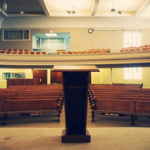 Article by Pastor Joe Thorn of Redeemer Fellowship in Saint Charles, Illinois. (original source here)
Article by Pastor Joe Thorn of Redeemer Fellowship in Saint Charles, Illinois. (original source here)
In every church and every generation of Christians, there is the potential to lose our focus on the things that are most important (Heb. 2:1). We must constantly remind ourselves and re-center our churches lest we find ourselves trusting in something other than the gospel of God and the Word of God.
One of the more dangerous drifts happening in our local churches today is within our corporate worship. In many churches there is a de-emphasis on the means of grace (Scripture, prayer, and the sacraments or ordinances), and a reliance on entertainment. Some try to balance the two in the name of reaching more people with the gospel, but there is an inescapable danger in overvaluing entertainment and implementing it in corporate worship.
This is not a new phenomenon. The nineteenth-century pastor Charles Spurgeon said, “The devil has seldom done a cleverer thing than hinting to the church that part of their mission is to provide entertainment for the people, with a view to winning them.” It may not be new, but it is increasingly popular, especially in light of our entertainment-driven culture. We see this in secular songs played by worship bands to wow the crowd. It’s hard to miss the value of amusement in the comedy-full but theology-empty preaching of many pulpits. Many of us have felt it in elaborate performances for the congregation to observe, but not to participate in. For some, Sunday morning more closely resembles a variety show than an offering made to God. The danger in bringing entertainment into gathered worship lies in the aim of entertainment and its work against the aim of worship.
I am not suggesting that church should be boring or that every church should have identical worship services, as if there is only one appropriate form in which to worship the Lord. Corporate worship from church to church varies in many ways. The styles, music, and liturgies developed in particular contexts and traditions lead to different flavors in worship. The church of Jesus Christ is made up of people, and therefore congregations, from every tribe, tongue, and nation, and this means diversity from church to church. This is often a good thing, something we can celebrate, as long as the church’s worship is ordered according to the parameters of Scripture and offered by faith.
The encroachment of entertainment into our worship is not a matter of style but of substance. Entertainment is a good thing, but its purpose is the refreshment of the mind and body, not the transformation of the mind or the edification of the spirit. The danger of entertainment in worship is not about which musical instruments are permitted or what era of hymns the church should sing. The danger is found in what the church is aiming at.
Entertainment has a different aim than worship. Entertainment is something offered to people for their amusement. Yet worship has a different focus and produces a different result.
The focus of worship is God, not man, which immediately pits it against entertainment. We offer ourselves to the Lord individually and collectively on Sunday morning. The church ascribes honor to God in the reading, preaching, singing, and praying of His Word. True worship is inherently God-centered and God-directed. What is done when the church is gathered is to be done according to God’s will and for His pleasure. This stands in opposition to entertainment, which is a spiritually powerless work directed at the people.
While worship is to be directed at God, it simultaneously offers much more than entertainment can ever deliver. As the church draws near to God, the Lord draws near to us, and we receive grace. Grace—regenerating grace, renewing grace, reviving grace—is offered to the congregation through the means of grace. The result of worshiping God in spirit and truth is transformation. Entertainment cannot lead to edification. Entertainment can stir the emotions, but God uses the means of grace to change our affections. Entertainment might draw a crowd or captivate a congregation, but only the means of grace will draw people to Christ and conform them to His image.
The beauty of worship is that it is infinitely more powerful than entertainment. Entertainment seeks to replicate drama and awe. But the grace of God in worship unveils the deepest drama in the world and produces authentic awe in the light of the revelation of God.
True worship may be painful one moment and joyful the next, as we encounter God’s law and gospel, confessing our sins and resting in the pardon we have in Jesus Christ. What is more dramatic than condemned sinners being forgiven by a holy God? Than slaves’ being set free by the Savior? What is more thrilling than the Son of God’s standing in the place of the ungodly to save them from God’s wrath? The church doesn’t need a performance of any kind to aid us in worship. We need the Word of God read and preached, prayed and sung, for in this we exalt and experience our triune God.
Entertainment has its place and serves a good, if earthly, purpose. Our local churches will do well to be careful of drifting toward it in an effort to draw or address the needs of sinful men and women. The Scripture is what God uses to penetrate the soul and change the heart. May we give ourselves to worship the Lord in spirit and truth, rather than mere emotion and amusement.
